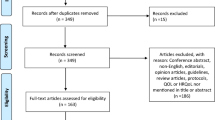Abstract
A revision of the Quality of Life Questionnaire (QLQ-C30) of the European Organization for Research and Treatment of Cancer (EORTC) was undertaken to improve low internal consistency estimates (Cronbach's alpha) and content validity for the role functioning scale and a conceptual difficulty (undue emphasis on physical functioning) in the global quality of life (QOL) scale. The role functioning items were reworded and a four-category response format was substituted for the previous dichotomous format. A new item asking about ‘overall health’ was substituted for the ‘overall physical condition’ item in the global QOL domain. The original and new versions were tested at three time points in a total of 1,181 patients with cancer in Canada (n=696) and the Netherlands (n=485). In both samples there was a marked improvement in internal consistency for the role functioning scale (Cronbach's alphas ranging from 0.78-0.88) in the new version. In the global QOL scale, the substitution of the new item for the previous one did not alter internal consistency (Cronbach's alphas ranging from 0.81-0.92). The revised versions of the role functioning and global QOL domains have been incorporated into the QLQ-C30 (version 2.0).
Similar content being viewed by others
References
Aaronson NK, Ahmedzai S, Bullinger M, et al. The EORTC core quality of life questionnaire: interim results of an international field study. In: Osoba D, ed. Effect of Cancer on Quality of Life. Boca Raton, FL (USA): CRC Press, 1991: 185-203.
Aaronson NK, Ahmedzai S, Bergman B, et al. The European Organization for Research and Treatment of Cancer QLQ-C30: a quality-of-life instrument for use in international trials inoncology. JNatl Cancer Inst 1993; 85: 365-376.
Osoba D, Zee B, Pater J, et al. Psychometric properties and responsiveness of the EORTC Quality of Life Questionnaire (QLQ-C30) in patients with breast, ovarian and lung cancer. Qual Life Res 1994; 3: 353-364. EORTC QLQ-C30 (version 2.0)
Bjordal K, Kaasa S. Psychometric validation of the EORTC Core Quality of Life Questionnaire, 30-item version and a diagnosis-specific module for head and neck cancer patients. Acta Oncol 1992; 31: 311-321.
Ringdal GI, Ringdal K. Testing the EORTC Quality of Life Questionnaire on cancer patients with heterogenous diagnoses. Qual Life Res 1993; 2: 129-140.
Niezgoda HE, Pater JL. Avalidation study of the domains of the core EORTC Quality of Life questionnaire. Qual Life Res 1993; 2: 319-325.
Hjermstad MJ, Fossa SD, Bjordal K, et al. Test/retest study of the European Organization for Research and Treatment of Cancer core Quality-of-Life Questionnaire. J Clin Oncol 1995; 13: 1249-1254.
Schaafsma J, Osoba D. The Karnofsky performance status scale re-examined: a cross-validation with the EORTCC30. Qual Life Res 1994; 3: 413-424.
Kaasa S, Bjordal K, Aaronson N, et al. The EORTC Core Quality of Life Questionnaire (QLQ-C30): Validity and reliability when analyzed with patients treated with palliative radiotherapy. Eur J Cancer 1995; 31A: 2260-2263.
Groenvold M, Bjorner JB, Klee MC, Kreiner S. Test for item bias in a quality of life questionnaire. J Clin Epidemiol 1995; 48: 805-816.
Cronbach LJ. Coefficient alpha and the internal structure of tests. Psychometrika 1951; 16: 297-334.
Lofters W, Zee B. Dolasetron vs. ondansetron with or without dexamethasone in the prevention of nausea and vomiting in patients receiving moderately emetogenic chemotherapy [abstract]. Support Care Cancer 1995; 3: 338.
Osoba D, Pater JL, Zee B, et al. Effective antiemetic therapy improves quality of life (QOL) after moderately emetogenic chemotherapy (MEC) [abstract]. Qual Life Res 1995; 4: 467-468.
Nunally JC, Bernstein IH. Psychometric Theory. Third Edition. New York, NY (USA): McGraw-Hill, 1994: 264-265.
Steel RGD, Torrie JH. Principles and Procedures of Statistics. Second Edition. New York, NY (USA): McGraw-Hill, 1960.
Fayers P, Aaronson N, Bjordal K, Sullivan M. EORTC QLQ-C30 Scoring Manual. Brussels, Belgium: EORTC Study Group on Quality of Life, 1995.
Author information
Authors and Affiliations
Rights and permissions
About this article
Cite this article
Osoba, D., Aaronson, N., Zee, B. et al. Modification of the EORTC QLQ-C30 (version 2.0) based on content validity and reliability testing in large samples of patients with cancer. Qual Life Res 6, 103–108 (1997). https://doi.org/10.1023/A:1026429831234
Published:
Issue Date:
DOI: https://doi.org/10.1023/A:1026429831234




